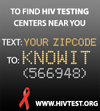| April: Minority Health Month
|
This epidemic doesn't call for mourning, but for organizing, mobilizing, informing.
"The most important message for our communities is: we need to take responsibility for our actions," stresses Jay Blackwell, Director of the Capacity Development Division at the Office of Minority Health Resource Center (OMHRC). "HIV/AIDS is 100% preventable, and it takes individual commitment to stop the spread in every community."
"We need to talk about HIV/AIDS. Talk to friends, social groups and significant others about staying negative,” Blackwell calls. "We are ALL impacted by HIV/AIDS, yet many of us remain in denial and do not recognize or admit this fact.”
Although there has been progress, stigma still has an enormous impact in continuing HIV infections. Fear and stigma are often linked in preventing entire families and communities from getting factual information about HIV and AIDS.
"There is also a profound lack of communication between the generations when it comes to talking about HIV/AIDS, and this impairs current and future generations from receiving the skills they need to stay healthy and alive,” explains Blackwell.
"To ensure that research advances benefit all members of society, increased involvement of African Americans and people of all other ethnicities is critical, as researchers, community educators and advocates,” said Dr. Anthony S. Fauci, Director of the National Institute of Allergy and Infectious Diseases National Institutes of Health, on the National Black HIV/AIDS Awareness and Information Day 2006, this February.
"In particular, to ensure that treatments and vaccines will work for everyone, representation of all racial and ethnic groups is needed in clinical trials. Tens of thousands of HIV-negative volunteers will be needed as new vaccines, therapies, microbicides and other interventions enter the pipeline for clinical testing,” Dr. Faucy remarked.
Action steps:
- Get tested,
 and have everyone you know go to have an HIV test;
and have everyone you know go to have an HIV test; - Talk to everyone about staying negative: HIV/AIDS is 100% preventable;
- Be active in sharing and disseminating information about HIV/AIDS in our communities;
- Be a role model for our youth by engaging in healthy behaviors, so that the risky ones become un-cool;
- Volunteer in HIV/AIDS clinical trials;
- Mobilize efforts in your communities to combat HIV/AIDS;
- Coordinate your community's initiatives with research institutions, pharmaceutical companies, national organizations and local community and church groups.
The message is clear: Stand up, and be counted!
Links
HIV/AIDS Prevention
http://www.cdc.gov/hiv/dhap.htm
What's new about HIV/AIDS?
http://www.cdc.gov/hiv/whatsnew.htm



